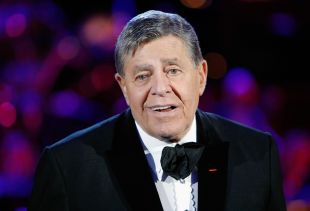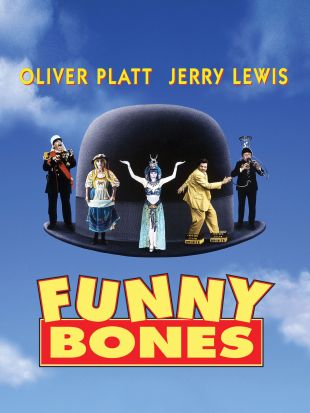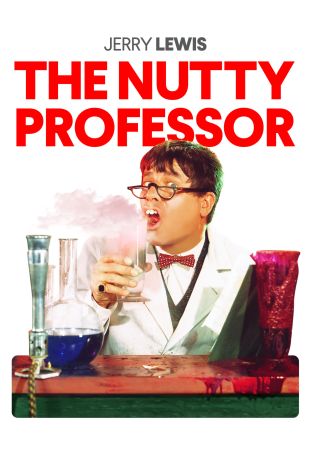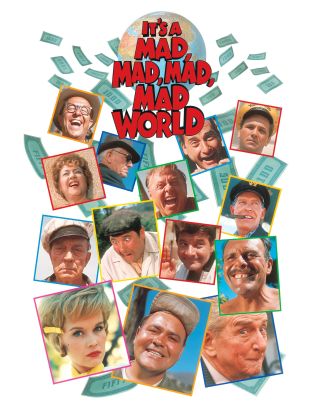Perhaps no popular film artist in history inspired quite so many conflicting opinions and emotions as actor/comedian Jerry Lewis. Often reviled in his native United States but worshipped as a genius throughout much of Europe and especially France, Lewis took slapstick comedy to new realms of absurdity and outrageousness, his anarchic vision dividing audiences who found him infantile and witless from those who applauded the ambitions of his sight gags, his subversions of standard comedic patterns, and his films' acute criticisms of American values. Regardless of opinion, he was not only one of the biggest stars of the postwar era but also one of the most powerful, and as the writer, director, and producer of many of his features, he qualified as a comic auteur firmly in the tradition of Chaplin and Keaton.
Born Joseph Levitch in Newark, NJ, on March 16, 1926, he was the son of borscht-belt comics, spending the majority of his childhood living with relatives but joining his parents each summer as they performed in the Catskills. From the age of five on, Lewis occasionally performed in his parents' act, and later quit high school in order to travel with his own comedy routine, which consisted primarily of mocking famous entertainers while their records were played off-stage. His early years as a performer were lean, and he often resorted to work as a soda jerk, a theater usher, an office clerk, or any one of a number of short-lived jobs. During the summers, he too made the rounds of the Catskills' borscht circuit, but otherwise enjoyed little success.
In 1946, Lewis met another struggling performer, a handsome singer named Dean Martin. Later that year, while playing Atlantic City's 500 Club, another act abruptly quit the show, and Lewis suggested Martin to fill the void. Initially the two performed separately, but one night they threw out their routines and teamed on-stage, a Mutt-and-Jeff combo whose wildly improvisational comedy quickly made them a star attraction along the Boardwalk. Within months, Martin and Lewis' salaries rocketed from 350 to 5,000 dollars a week, and by the end of the 1940s, they were the most popular comedy duo in the nation. In 1949, they made their film debut in George Marshall's My Friend Irma, and their supporting work proved so popular with audiences that their roles were significantly expanded for the sequel, the following year's My Friend Irma Goes West. With 1951's At War With the Army, Martin and Lewis earned their first star billing. The picture established the basic formula of all of their subsequent movie work, with Martin the suave straight man forced to suffer the bizarre antics of the manic fool Lewis. Critics often loathed the duo, but audiences couldn't get enough. In all, they made 13 comedies for Paramount, among them 1952's Jumping Jacks, 1953's Scared Stiff, and 1955's Artists and Models, a superior effort directed by Frank Tashlin. For 1956's Hollywood or Bust, Tashlin was again in the director's seat, but the movie was the team's last; after Martin and Lewis' relationship soured to the point where they were no longer even speaking to one another, they announced their breakup following the conclusion of their July 25, 1956, performance at the Copacabana, which celebrated to the day the tenth anniversary of their first show.
Working again as a solo performer, Lewis also served as producer on his first post-Martin star vehicle, 1957's The Delicate Delinquent. Reviews were good, and later that same year he starred in The Sad Sack. With 1958's Rock-a-Bye Baby, he teamed again with Tashlin, the first of six Lewis comedies the director helmed; they next united for The Geisha Boy. Under Norman Taurog, Lewis returned in 1959 with Don't Give up the Ship. At the time of its release, he signed an exclusive contract with Paramount for ten million dollars and 60 percent of his box-office profits, the biggest payday of its kind in Hollywood history; at its peak, his popularity was so great that he even starred in a DC Comics book. Lewis celebrated his success by making another feature for Taurog, 1960's Visit to a Small Planet, before returning to work under Tashlin for Cinderfella.
With 1960's The Bellboy, Lewis made his directorial debut. Here his comic vision began to truly take flight, with only a bare-bones plot and virtually no dialogue to best serve his ambitious gags. He also directed and produced 1961's The Ladies' Man, a lavishly filmed, vicious satire on American femininity, followed by The Errand Boy, another collection of sight gags which earned favorable comparison to the work of Jacques Tati. Under Tashlin, Lewis next starred in 1962's It's Only Money. Returning to the director's chair, he filmed his masterpiece, The Nutty Professor, a comic retelling of the Dr. Jekyll and Mr. Hyde tale which, while dismissed by American critics, solidified his following among European filmgoers, especially the staff of the influential Cahiers du Cinema.
In between 1963's Who's Minding the Store? and 1964's The Disorderly Orderly, both written and directed by Tashlin, Lewis also helmed The Patsy, his most ambitious work to date. In 1965's The Family Jewels, he not only wrote and directed, but also played seven different roles. The picture was among his first not to become a major box-office success. He subsequently traveled to France to star in John Rich's Boeing Boeing. There "Le Roi du Crazy" (as he was dubbed) was met by adoring fans and critics with a three-week film festival, as well as a complete retrospective at the Cinematheque Francais. However, the feature was Lewis' last for Paramount, who found his insistence upon complete artistic control to be at odds with the increasingly disappointing box-office showings of his films.
In 1966, after landing at Columbia to direct and star in Three on a Couch, Lewis hosted his first Labor Day telethon to raise funds in support of the Muscular Dystrophy Association. The star-studded event quickly became an institution, annually bringing in millions upon millions in charitable contributions. Lewis next starred in the Gordon Douglas space comedy Way, Way Out, followed by 1967's The Big Mouth, which he directed and co-wrote. He next appeared in Jerry Paris' Don't Raise the Bridge, Lower the River and George Marshall's Hook, Line and Sinker, subsequently directing (but, for the first and only time, not starring) in 1969's One More Time. None of the movies found favor with audiences or critics, however, and after the failure of 1970's Which Way to the Front?, Lewis' career in Hollywood was in grave condition. While seeking funding for his next project, in 1971 he wrote a book, The Total Filmmaker. With financing from the Swedish-based Cinema and Film Enterprises, in 1972 Lewis mounted The Day the Clown Cried, a disturbing tale focusing on a famous clown forced by the Nazis to lead children to their deaths in the gas chambers. Widely speculated to be either a transcendent masterpiece or an obscene failure, the radical feature was never released, remaining trapped in legal limbo. Lewis spent the remainder of the decade out of film, appearing instead in the disastrous Broadway production Helzapoppin' as well as in concert and on the lecture circuit. Finally, in 1979 he wrote, directed, and starred in Hardly Working; though not released until two years later because of financial entanglements, the movie proved to be a major success, grossing over 50 million dollars in North America alone.
In late 1982, Lewis was declared clinically dead after suffering a massive heart attack. He was miraculously revived, and the excessive lifestyle that led to his near-death experience became the subject of his 1983 feature Smorgasbord, which later premiered on HBO as Cracking Up before finally bowing in theaters in 1985. In the meantime, Lewis garnered some of the best reviews of his career for his work in Martin Scorsese's The King of Comedy, but his performance did not lead to work in other major Hollywood productions. As a result, he traveled to France, appearing in the 1984 comedies To Catch a Cop and Par Ou T'es Rentre? on T'a Pas Vue Sortir. The dismal Slapstick of Another Kind also arrived in 1984, with only small roles in the 1987 telefilm Fight for Life and Susan Seidelman's 1989 effort Cookie, as well as an extended supporting turn in the television series Wiseguy. By the 1990s, Lewis experienced something of a resurgence. Although he remained unable to secure directorial work, he did appear in the major studio films Mr. Saturday Night and Funny Bones. Additionally, he starred on Broadway in a successful revival of Damn Yankees and in 1996, The Nutty Professor was remade by Eddie Murphy.



